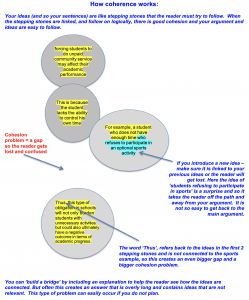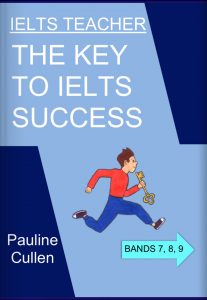People often ask me to review their writing a day or two before their test date. With only a few days to go before a test, there is not a lot you can change in your writing. However, there are key changes you can make to the way you approach the test on the day – changes that can have an impact on your score.
Here are some tips for during your IELTS writing test:
Writing task 1
- Consider doing this task second so that you only spend 20 minutes on it.
- For GT, spend a few moments thinking about the situation. Think about who you are writing to and why you are writing. To help you write in the correct tone, think of a real person you know and imagine you are writing to them. Use each bullet point as a new paragraph.
- For Academic, spend some time looking at the information to make sure you interpret it accurately. Think about the main points and make sure to compare the information if it is relevant to do so, and write an overview.
Writing Task 2
- To achieve the best score that you can in Task response, before you write, spend a few moments thinking about what the question is about and what you are being asked to discuss. Consider the issue, then decide how you feel about it. This will tell you what your position is. Writing about what you actually think and feel, and about what you know, will help you to write clearly and logically. In my experience, when people write about what they really feel, their position is clear throughout.
- Don’t begin writing without first organising your thoughts. Remember, writing is thinking we can see, so thinking must be involved in your planning. Clear thinking will result in clearer writing.
- To improve your Coherence and cohesion score, make sure that you write a rough plan of your main points. This will help you to organise your paragraphs and ideas logically.
- When you are writing, make sure that each point follows on logically from the next. The following extract from one of my Facebook posts shows a common problem with Coherence and cohesion. The paragraph was part of a candidate’s answer to a question about compulsory community service from Cambridge test book 9. I have corrected the language problems so that we can focus on the coherence problem, which is shown in red.
 In this next image, I have taken the ideas from the paragraph and tried to show how they should act like stepping stones forming a path that the reader can follow. As you can see, the example used is not logically connected to the other ideas in the paragraph, so it causes the reader to get lost:
In this next image, I have taken the ideas from the paragraph and tried to show how they should act like stepping stones forming a path that the reader can follow. As you can see, the example used is not logically connected to the other ideas in the paragraph, so it causes the reader to get lost:

5. Finally, aim to write in a way that is clear, not in a way that shows off as much of the high-level vocabulary you have learned.
I often use 2 birds to help make this point: a carrier pigeon and a peacock. 
A carrier pigeon is a very ordinary bird, but it can be used to carry important messages, which it does so in a very fast and efficient way.
In contrast, a peacock spends a great deal of time walking in circles and showing off its wonderful feathers. We would never think of using a peacock to carry an important message so don’t turn into a vocabulary peacock during the test.

For more tips and advice, be sure to read The Key to IELTS Success.




Thank you Pauline, you advice is much helpful for students near their exam date.
I can’t agree more with the last part of your article about the pigeon and peacock. I think many students possess quite impressive vocabulary but they cannot put them in a linear reasoning. What I usually do to address this problem is to ask myself “why” and “so what” and answer these questions or think about example to provide rationale for my reason. May I ask you to share your tips on training your thinking in writing? Thanks so much for your support, I really appreciate your time and look forward to your response.
Anh
Chapter 7 of The Key to IELTS Success explains how to do that.
Hi dear Pauline
I read carefully your free book,which is the leading one in this criteria, but I couldn’t make out what is the practical way of expanding our points in logical way.Since my mind is stuck in this idea that I have to certainly provide an example,otherwise,my reasons will not be supported correctly.
Hi Sheri, it may be worth re-reading chapter 7 where I discuss how to write a paragraph. There are several ways of expanding on a point: explaining why, explaining a key detail, giving an example, stating what can happen as a result etc. My next book will help more with this.
Hi Pauline,
I read this in a website that if you don’t have an example in your essay, your task response is 5 or 6, is this true? should I always have an example in my essay?
The task says ‘Give reasons for your answer and include any relevant examples from your own knowledge and experience.’ Examples help to support your ideas and show why you believe what you believe. I don’t agree that a lack of an example reduces your score to 5 or 6, but it is true that a lack of support for your ideas will lower your score. However, be careful not to simply invent examples – there are other ways to support your ideas and provide ‘proof’ of something without saying ‘For example, a recent study….’ Read chapter 7 of The Key to IELTS Success to understand this better.
So I can achieve 7 or 8 even without an example if I support my main ideas well, right?
That is not possible to say because I have no idea if you are capable of showing that support.
My point is simply this:
Most people stuck at band 6.5 interpret the words ‘include any relevant examples’ in a very narrow way. They believe that it means ‘I must include one sentence that says: ‘For example,…’
They then invent an example which often does not help at all to support their ideas.
There are other, often better ways to support your ideas without writing a sentence like that. You can also provide an example of something without using the words ‘For example.’
In test book 11, the sample answer on page 137 shows this.
People who learn invented examples to cut and paste into their paragraphs stay stuck at band 6 or 6.5. Again read chapter 7 of The Key to IELTS Success to understand this point better.
Hi Pauline ,
What are the parts of the task in writing task 2?!
Thank you for your helpful feedback !
I’m not sure what you mean by ‘parts’? Task 2 has one one question – a discursive essay. Have you read my free book, The Key to IELTS Success? It tells you all about the test and how to study.
Dear pauline, could you please send me a book of your ielts vocabulary advanced book for me. I need this book. But in bangladesh there is no shop to buy original book. I already have managed ielts vocabulary book. Now i need advanced book. Please send me a book with your autograph. I hope it will inspire me for future success in Ielts. Liton Sharma, House no 7/18,Salimullah Road, Mohammadpur, Dhaka, Bangladesh.
Hi Liton, I’m afraid I can’t afford to buy books to give away and I don’t have free copies to send to people. You can order any of my books directly from Cambridge – they will post anywhere in the world for a small fee. You can find links to help you order my books on this page:https://keytoielts.com/product/cambridge-vocabulary-for-ielts-advanced/
I don’t have cambridge 11 but I understand your point. Thank you very much
Great 🙂
Hi Pauline,
I have one question about the band descriptors, what is my score for example in task response if I have some features of band 7 or 8 and some features of band 5? One of my teachers who said she was an examiner before said I would get a 5, because in order to achieve a band score I should have all the features of that band and because I don’t have all the features of 8, 7 or even 6 I would get a 5 for task response. Is this true?
In order to score band 7 you need to score band 7 consistently. The same is true for each band. I have to say that I have never seen a response where some features were band 8 and some were band 5. This post may help to answer you question:https://keytoielts.com/a-common-problem-for-candidates-between-band-6-and-band-7/
Hi again and thanks for the response.
There is sample essay in cambridge book 8 for general training test A that got 7. From the notes the examiner has written on task response it is clear that the sample has some of the features of band 8 or 9 (the examiner writes that the answer is a sophisticated response to the FIRST question, reasons for increases in both long-distance and local travel are analysed and argued), but the writer does not answer the second question (the second question on the benefits for the traveller is not addressed at all, so the task is only partially answered and this limits the rating). The other problem with this script is that it is not written in paragraphs, though other aspects of coherence and cohesion are managed well (although the answer is logically organized and ideas are well-linked, unfortunately there is no attempt at paragraphing). and the examiner then continues that a wide range of language is used naturally and accurately, which I suppose puts this sample at a 9 for LR and GRA. So as the overall score is 7 I believe the candidate received a 5 for TR and CC, and 9 for LR and GRA. All the same, the candidate has shown some of the features of band 8 or 9 and some others of band 5 in both TR and CC. So is it right to say that if you have features of both bands 8 and 5 in a criterion, you will get a 5 for that criterion?
Thanks for your support.
I’m afraid I don’t have a copy of that book, so I can’t comment on the level of the writing. From your response here, you seem to assume that you know what the TR score would be, but it is impossible to state what the breakdown of scores would be. The description of the answer here suggests to me that this may have been a native speaker response. Many native speakers have to take IELTS and many of them do so with little or no formal training for the test. I am occasionally contacted by people taking the test for immigration purposes and worried that they have not written an essay since high school, sometimes even longer if they studied a trade. Essays like these can raise problems not seen in non-native speakers responses, so I am not really sure why it is helpful to work out the break down and try to draw some conclusion from it about how the band 7 was arrived at. The comments seem to be explaining why this is not a band 8 or 9 and this is the best way to interpret them.
Hi again Pauline,
Thanks for your response, I understand that you might think it is unhelpful to try to break down the score, but I’m actually an IELTS teacher, I took the test in March and got an 8 in writing and an overall 8.5 (thanks to your books and apps, and your online presence and advice). The reason why I need to know the breakdown of a writing score is because I sometimes have students who are native speakers who struggle a lot with TR and CC (like the sample in cambridge 8).
I think I know the breakdown of this particular sample just because the phrases the examiner has used in comments are borrowed from the band descriptors (some phrases from band 5 and some from band 9 in TR and CC), and that’s why I asked for your help because I don’t know the scoring when the answer is well-organized and ideas are well-linked, but there is no attempt at paragraphing, or when the first question is argued and analysed perfectly but the second question is not answered at all.
If you’re dealing with native speakers then I can see that it would be helpful. Can you give me a screenshot of the answer and the question so that I can be more helpful?
absolutely, where should I send the screenshot to? because I can’t attach photos here.
Can you post it in a direct message to me on Facebook?
Hi Pauline,
I asked a question 3 or 4 days ago about one of the exercises in the vocabulary book. I don’t know if you got my question
I was traveling and did not have my book with me to be able to answer with any detail.
Hi Pauline
By parts I mean what is mentioned in band descriptors for writing task 2. “ADDRESSES ALL THE PARTS OF THE TASK”.
I have recently attended a writing workshop by IDP , where the trainer talked of main parts in the question such as ADVANTAGES and DISADVANTAGES , which have to be addressed. I wonder if the ideas in the statement about the topic are also considered to be parts of the task , which need to addressed as well to get 6 or above in TR.
Yes, in fact you need to go further and see that ‘all parts of the task’ refers to 1) the initial statement which details the topic you must discuss and the context for your essay 2) the question(s) you are given, and 3) the information in the rubrics as well. In other words, your task is to: discuss the issue in the topic; say ‘To what extent you agree or disagree,’ and give reasons for your answer, and include relevant examples from your own experience. I do explain this in chapter 7 of The Key to IELTS Success.
Hi Pauline,
I took the IELTS today, there was a true/false/not given question in the reading test that I am not sure about, can you please help me with the answer? The passage read ” Train travel to and from the Sydney domestic and international airports on the Airport Line requires an additional Gate Pass station access fee (available for adults and concessions).” and in the question it said “There is an extra charge when you use the Airport Line to any of the Sydney airports.” (I am sure about the wording of both the question and passage) I think the answer is true, but the word any makes me doubt it, can you please tell me what you think about the answer? I appreciate your help.
Yes, the answer would be True (an additional fee = an extra charge)
thank you very much, so domestic and international airports means any airports, right?
Yes, those are the 2 different types of airport
Hi,
I sent it as a direct message to your facebook, I can’t remember the last time I used facebook, I hope you’ll get the message, and thank you very much pauline for this
I Got it, Tarigh, thanks for this. I’ll get back to you in the next day or so with comments. I would say that it is clearly a native speaker response and that many people like that take the test assuming that they don’t need to prepare. They may believe that their native-speaker level will be noticed and that this will be rewarded. However, the test must assess according to the criteria and so native speakers are judged by exactly the same standards as every other candidate. I always say that they should see this as similar to an A level qualification that deserves respect and preparation. I’ll comment more when I’ve looked at it in detail.
Thanks a lot
Hi,
I have a question about essay writing. You always say that I should write about what I actually think. Many other teachers say, for instance, when the question asks you to what extent you agree or disagree it is easier to say that I entirely agree or disagree, brcause when you say that you agree with some part and disagree with some others it makes your position unclear. Do you think this is true? Is it better to say that I completely agree or disagree?
But if that is your position, then it will not be at all clear. The problem of a position becoming unclear happens when someone writes ‘I entirely agree’ then, (because this is not true) their essay shows that they only agree in part. That is when you position will become unclear. Writing what you actually think will make it very clear what you think because your essay will reflect that.
That’s true, but you also say it’s important that your essay has balance, but if I entirely agree or disagree how can I achieve balance? Is it a must to say why people who disagree with you are wrong or are there other ways to achieve balance? Thank you for your support.
The balance comes from looking at all sides of the issue and making sure you cover all parts of the question equally.
Hi PAULINE,
I have a question about TR in writing. Take this question as an example, please: “Some people spend a lot of money on tickets to go to sporting or cultural events. Is this a good thing or a bad thing?”
I just write about the positive aspects: body1 – advantages both for fan and athletes, body2- economic benefits.
Is it insufficient for band 7 in writing?
Did I have to write about the negative aspects to get band 7?
I know other parameters including CC, LR, GR are important, too. I’ve assumed that these parameters are good enough to get band 7.
I also have a question about how much concession paragraph is important. Is it necessary in such questions ” Some people believe that unpaid community service should be a compulsory part of high school programs. To what extent do you agree or disagree?” to write a paragraph as a concession or refutation? I mean I have to write a paragraph about the opposite view and reject it?
Thank you in advance for taking time for me.
If you are being asked if something is good or bad, or whether you agree or disagree, you should consider both sides in your essay then reach a conclusion about it. With your plan to only write about the positives – those you mention seem connected to me and your essay is likely to be repetitive – what are the advantages to the athletes if they are not related to money? I’m not clear how fans would benefit from ‘spent a lot of money’ on tickets. Can you tell me where the question comes from?
Hi Pauline,
I read this post, but I read the many other comments you wrote on a similar question and came to the conclusion that when the question asks whether you agree or disagree it is also possible to say that you entirely agree and give reasons for your agreement without mentioning disagreement?
You also mentioned in a comment how the two questions are different, when it says “is this a positive or negative development” and when it says “do you agree or disagree”, you said in the first question we need to talk about both the positive and negative aspects of something, but in the second question we might only talk about agreement or disagreement, am I right?
Hi Jaber, I am not sure where you get the idea that I advise you to only discuss what you entirely disagree or agree with. In every post or comment about this I have tried to make it clear that native speakers who are professional writers may be able to get away with it, but those at the band 6-7 level usually ignore part of the question or sound very repetitive when they only write about their agreement or their disagreement. Therefore, I never advise anyone to do this.
Hi Pauline,
I actually have a question about speaking. I am an IELTS teacher and one of my students has a severe stutter and she can barely utter a single chunk without frequent pauses. Does this affect her speaking score?
Hi Melo, for candidates with difficulties like this, they need to get a medical certificate and take this to the test centre when they apply for the test. The examiner will certainly take it into account.
Hi Pauline,
I am an IELTS teacher and I found this post to be extremely useful, so thank you for that. I have a question though, I know that you have improved the language but in terms of coherence and cohesion, would you say that this paragraph is at band 6? And if so, is it because it impedes “clear progression throughout” that is needed for band 7? Thank you for your support.
Hi Melody, it’s a tricky one – to single out one paragraph is unfair (if the entire essay was like this, it would be band 5, but the other paragraphs were more coherent. I used this as a good example of where things can go wrong in terms of organisation and the logical linking of ideas. It is a good example of how CC can also have a knock-on effect to Task response – this is a good example of ‘conclusions may become unclear’ and ‘main ideas may be unclear’. I hope this helps.
Thank you Pauline for the reply. What you said about the effect this can have on Task Response was very interesting and makes a lot of sense, but when I read this paragraph I understand where it’s going, this progression is not clear throughout the paragraph as you said, but I understand the overall meaning. Isn’t that a feature of band 6 for CC, because in band 5 there is lack of overall progression. So do you think you can help me understand why this paragraph is at band 5? Thanks a lot.
Hi melody, Band 6 says :”arranges information and ideas coherently and there is a clear overall progression” – my point is that I don’t think we can judge this ‘overall progression’ from one paragraph alone. I always hesitate to label the language in particular paragraphs because people can tend to misunderstand the point – I am not saying it is band 5, I am saying that there are features within the paragraph that you could argue were a lower level if we take it out of context (e.g. band 5 says ”presents information with some organisation but there may be a lack of overall progression”. Sorry If I am being obtuse, I don’t mean to be, I just hesitate to pin down short extracts as I think it confuses the whole issue.